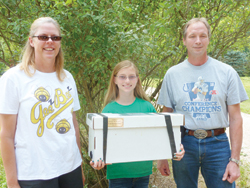



The Buzz About Bees
Beekeeping
is a growing hobby
in Indiana among young and old
Program
aims to help get
more people involved in bees
By
Tess Worrell
Contributing Writer
(November 2012) – Most 14-year-old girls concentrate
on school, friends and extracurricular activities. Nyla Dugle is no
different. But along with the homework and band contests, Dugle adds
a unique hobby that focuses on the sweeter side of life. When Dugle’s
parents attended a monthly meeting of the Southeastern Indiana Beekeeping
Association, they simply wanted to gather information on a potential
interest. Then they heard that teens could win their own hive. The Dugles
entered their daughter’s name, and the rest is history.
 |
|
Photo
provided Beekeeping
advisor Ginger |
“I heard they were giving out a hive for each district
and had one for Jefferson County, so I tried for it. They picked me
out of all the kids,” says Dugle. She received a hive, smoker,
gloves and hat – plus a group, or nuc, of bees. Best of all,
Dugle was assigned a mentor to come alongside for every step of her
new interest. The mentor was Ginger Davidson of Hanover, Ind.
“Ginger is wonderful,” Dugle warmly exclaims. “All the
stuff arrived in a big box, and we took it to Ginger’s. She helped
me put the hive together. A few weeks later, they came with the bees,
and we put them in the hive. I essentially won everything to get started.
Now I go once a week to Ginger’s, and she helps me check my bees.
Then she shows me something about her bees. I learn something new every
week.”
“That’s the goal,” notes Davidson. “The average
beekeeper is 60 years old. I enjoy eating great food. We need younger
people caring for the bees to keep them pollinating if we’re going
to have that.”
Challenges for bees continue to grow. Diseases have taken a huge toll,
especially the damage done by the Varroa mite, whose larva feeds on
baby bees. Spraying by farmers protects crops but can harm bees if they
are in the vicinity during spraying. Fortunately, Dugle is part of a
wave of younger people taking an interest both in beekeeping and in
educating others about the importance of bees and ways they can help.
The major weapon against the Verroa mites also greatly assists beekeepers
in managing their hives. When bee hives get too crowded, the bees naturally
swarm. The queen bee takes a group of bees from the overcrowded hive
and forms a new hive elsewhere. The remaining bees make a new queen
and keep the hive going.
“Beekeepers lose a good portion of bees when the swarm moves on,”
says Davidson. To counteract, beekeepers take a group of bees away from
their queen in one hive and place in a new hive onsite before they swarm.
Without the queen, no baby bees. With no baby bees for food, the mites
don’t lay their eggs in the new hive.
Oddly, they don’t lay in the old one either, even though baby bees
are there. “Somehow it disrupts their whole life-cycle,” says
Davidson. “We keep all our bees and limit the mites.”
In teaching Dugle these techniques, Davidson passes along the growing
wisdom in the world of beekeeping.
Dugle actively promotes Driftwatch.org as a way to protect bees from
farm spraying. Beekeepers register their hives on the website. Farmers
check the site to find the beekeepers within a five mile area of where
they will be spraying and then notify the beekeepers the time they will
be spraying their crops. Beekeepers then can confine bees during the
spraying. Farmers protect their crops; beekeepers protect their bees.
so it’s a win-win.
When asked how much time caring for her bees requires, Dugle says, “I
spend about 30 minutes a week actually caring for the bees. I spend
longer with Ginger because she’s always showing me something, but
my hive doesn’t take long. I have about 100 things going on, but
I love caring for my bees. I love watching the bees – seeing
what they are doing. I wouldn’t trade this for anything.”
For those who would like to join Dugle, the Southeastern Indiana Beekeeping
Association meets the third Thursday of the month in Milan, Ind, in
Ripley County.
“We have beekeepers at all stages. The experienced keepers help
the younger ones. We help them with their equipment, we offer bees to
start their hives, and we provide a mentor,” says Davidson. “We
actually like giving the bees because we know they are survivor bees
– ready to thrive in this climate. When people mail order
bees, they get bees bred in warmer climates which may not do well here.
Because our bees are mating with others in the area, we’d rather
they all be healthy.”
• For those interested in joining the association, visit: www.IndianaHoney.org. The website has a wide variety of contacts, articles, and helpful hints for beekeeping as well as information on upcoming meetings.
